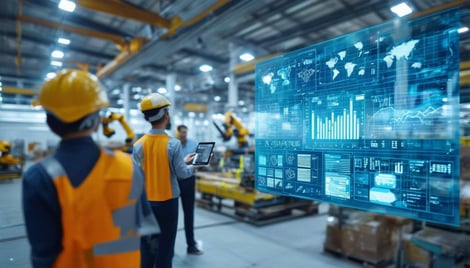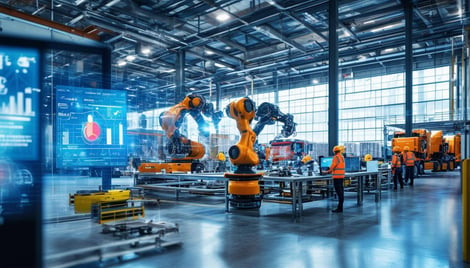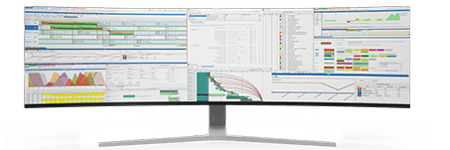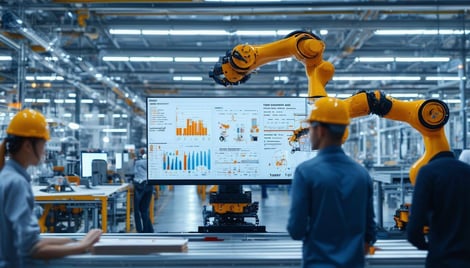Beyond Adoption: How AI Adaptation is Redefining Purchasing in Manufacturing
Artificial intelligence (AI) is no longer a futuristic concept but a critical enabler of efficiency, agility, and innovation in industrial manufacturing. For Purchasing Managers, the AI revolution isn't just about adoption—it's about adaptation. The integration of AI into procurement processes, supplier management, and operational planning has profound implications, especially when coupled with advanced tools like PlanetTogether and enterprise systems like SAP, Oracle, Microsoft Dynamics, Kinaxis, or Aveva.
This blog explores how Purchasing Managers can move beyond the initial stages of AI adoption and adapt these technologies to drive continuous improvement, cost optimization, and competitive advantage.

The Shift from Adoption to Adaptation
Adopting AI is the first step—integrating machine learning algorithms, predictive analytics, and intelligent automation into purchasing workflows. However, adaptation takes this a step further by embedding AI into the fabric of decision-making processes, creating a dynamic system that evolves with market demands, supply chain disruptions, and organizational goals.
Key Differences Between AI Adoption and AI Adaptation:
Adoption: Focuses on implementing AI tools and technologies to solve existing problems or enhance specific processes.
Adaptation: Involves refining these tools, customizing them to unique organizational needs, and ensuring they can evolve alongside changing business environments.
For a Purchasing Manager in an industrial manufacturing facility, this means leveraging AI to optimize procurement not just today but in a way that remains relevant and effective in the future.

Challenges in Adapting AI for Procurement
Transitioning from AI adoption to adaptation presents unique challenges:
Data Integration Across Platforms:
Procurement relies on diverse data sources—from ERP systems like SAP and Oracle to scheduling tools like PlanetTogether. Integrating AI solutions with these platforms requires robust interoperability and real-time data synchronization.
Dynamic Supplier Management:
AI adaptation requires systems that can evolve as supplier performance, costs, and market conditions change. Ensuring AI-driven insights remain accurate and actionable in a volatile supply chain environment is paramount.
Balancing Cost with Innovation:
Industrial manufacturers often operate on thin margins. Adapting AI technologies involves careful cost-benefit analysis to ensure investments in customization and scaling deliver tangible returns.
Cultural and Organizational Resistance:
Adaptation necessitates buy-in across departments. Procurement teams must collaborate closely with IT, operations, and finance to align AI initiatives with broader organizational objectives.
![]()

Leveraging Integration: PlanetTogether and Enterprise Systems
One of the most effective ways to enable AI adaptation is by integrating advanced planning and scheduling systems like PlanetTogether with enterprise solutions such as SAP, Oracle, Microsoft Dynamics, Kinaxis, or Aveva. This integration provides a unified platform for data analysis, scenario planning, and decision-making.
How Integration Drives AI Adaptation:
Enhanced Data Accuracy and Accessibility
Integrating PlanetTogether with enterprise systems ensures that AI algorithms work with consistent, high-quality data. For example:
SAP’s procurement and inventory data can feed into PlanetTogether’s scheduling algorithms, enabling real-time adjustments based on supply availability.
Microsoft Dynamics’ demand forecasting can inform procurement priorities, while PlanetTogether ensures these priorities align with production schedules.
Automated Supplier Performance Analysis
AI can analyze supplier performance metrics stored in ERP systems and provide actionable recommendations. For instance:
Oracle’s analytics capabilities combined with PlanetTogether’s planning tools can suggest alternative suppliers based on cost, quality, and delivery times.
Proactive Risk Management
Integration allows AI to monitor and predict risks, such as supply chain disruptions or fluctuating raw material costs. Kinaxis, known for its supply chain agility, paired with PlanetTogether’s scheduling capabilities, can enable proactive mitigation strategies.
Scalability and Flexibility
AI adapts better when systems are scalable. With Aveva’s industrial expertise, coupled with PlanetTogether’s dynamic scheduling, manufacturers can scale operations without sacrificing efficiency or adaptability.

AI Use Cases for Purchasing Managers in Industrial Manufacturing
Adapting AI to procurement processes can revolutionize the role of a Purchasing Manager. Here are some specific use cases:
1. Demand-Driven Procurement Planning
AI tools can analyze historical data, market trends, and production forecasts to recommend optimal procurement quantities and timings. Integration with PlanetTogether ensures these recommendations align with production schedules, minimizing inventory holding costs and reducing waste.
2. Supplier Risk Profiling
AI can evaluate suppliers not only on cost but also on reliability, sustainability, and geopolitical risks. Systems like Kinaxis can provide real-time visibility into supplier networks, while PlanetTogether ensures alternative plans are ready in case of disruptions.
3. Predictive Pricing Models
AI-powered predictive analytics can forecast price fluctuations for raw materials, enabling Purchasing Managers to lock in favorable contracts. By integrating with ERP systems like Oracle or SAP, AI ensures these insights are actionable and seamlessly incorporated into procurement workflows.
4. Automated Negotiation Assistance
AI chatbots and negotiation tools can analyze supplier quotes, suggest counteroffers, and simulate negotiation scenarios. Combined with scheduling data from PlanetTogether, these tools can prioritize cost-effective suppliers who meet production deadlines.
The Competitive Edge of AI Adaptation
For Purchasing Managers, the ability to adapt AI technologies is a game-changer. It empowers you to:
Proactively manage costs and risks.
Build more resilient supply chains.
Align procurement strategies with production needs.
Contribute to broader organizational goals, such as sustainability and digital transformation.
By integrating tools like PlanetTogether with enterprise systems such as SAP, Oracle, Microsoft Dynamics, Kinaxis, or Aveva, you create a robust foundation for AI adaptation. This not only enhances procurement efficiency but also positions your organization to thrive in a competitive and uncertain market.
The journey from AI adoption to AI adaptation is critical for Purchasing Managers in industrial manufacturing. It’s about moving beyond deploying technology to creating an ecosystem where AI continuously learns, evolves, and delivers value.
By focusing on integration, collaboration, and continuous improvement, you can unlock the full potential of AI, ensuring your procurement strategies remain agile, efficient, and future-ready.
Integrating advanced tools like PlanetTogether with enterprise systems isn’t just a technical upgrade—it’s a strategic imperative. As you adapt to this new era of intelligent manufacturing, the question isn’t whether AI will transform procurement—it’s how far you’ll go in adapting AI to transform your business.
Are you ready to take your manufacturing operations to the next level? Contact us today to learn more about how PlanetTogether can help you achieve your goals and drive success in your industry.
Topics: Industrial Manufacturing, PlanetTogether Software, Integrating PlanetTogether, Proactive Risk Management, Scalability and Flexibility, Automated Supplier Performance Analysis, Enhanced Data Accuracy and Accessibility, Demand-Driven Procurement Planning, Predictive Pricing Models





















LEAVE A COMMENT